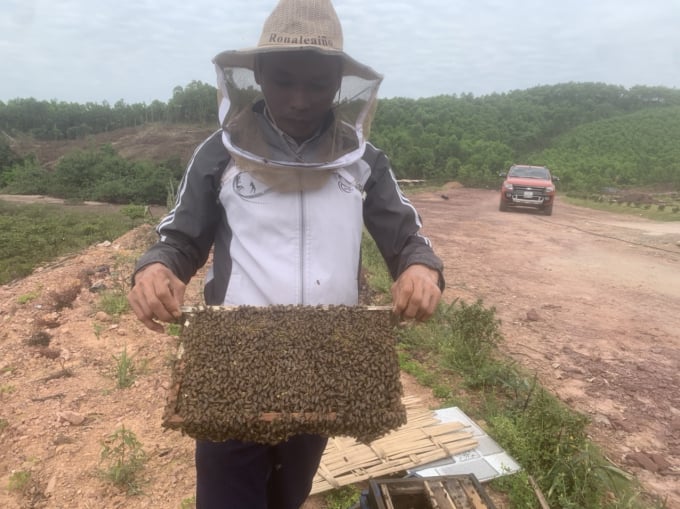May 21, 2025 | 10:11 GMT +7
May 21, 2025 | 10:11 GMT +7
Hotline: 0913.378.918
May 21, 2025 | 10:11 GMT +7
Hotline: 0913.378.918

As one of the pioneers in developing a model of beekeeping based in mangroves, Mr. Pham Van Tuan said that his father made him familiar with beekeeping from a young age. Anh: Nguyen Thanh.
Mr. Pham Van Tuan (Van Don district, Quang Ninh) has developed beekeeping by taking advantage of natural conditions. It is the first model in Quang Ninh province of commercial beekeeping based in mangroves.
Besides bringing a stable income, this model of natural beekeeping in Dai Xuyen commune, Van Don district, is also of great significance in protecting the environment of nearly 500 hectares of mangroves there.
The coastal mangrove forest of Van Don district is covered with the scent of millions of mangroves, tigers, and parrots. It is an abundant "food" source allowing bees to find honey in a natural environment, because mangroves are not affected by chemicals or pesticides.
Tuan often followed his father to care for the bees and was trained in beekeeping. With the determination to pursue his father's profession, he visited and learned about beekeeping models in many places throughout Quang Ninh province.
According to Mr. Tuan, compared to other livestock, beekeeping is difficult because it depends on nature and full understanding of the applied technical procedures. Capturing the ideal conditions of summer, when mangroves, tigers, and parrots are burst with life, he has placed 100 colonies of bees close to the mangroves so that the bees have an ideal growing environment. On average, a swarm of Mr. Tuan's bees can yield 5-6 liters of natural honey per year. With an average price of over VND 400,000 per liter, the income from selling honey is enormous.
Sharing more about the symbiotic relationship between mangroves and bees, Mr. Tuan said that farmers need to work for mangrove forest protection in parallel with beekeeping for honey, to bring about long-term and sustainable economic efficiency.
"Taking care of bees is like taking care of mangroves; in other words, beekeepers must be like a ranger. Beekeepers do not base on the advantages of available coastal mangrove forests. Also, flowers in the mangrove only bloom once a year, so the taste and color of the honey here are always unique and delicious," Mr. Tuan said.

The mangroves in Dai Xuyen have very diverse vegetation, with many species of flowers in bloom, so beekeeping along the mangroves always gives honey a natural quality. Photo: Nguyen Thanh.
According to Mr. Tuan, if you want to know the quality of honey, just put a bottle of honey in the freezer. If after a few days the honey does not solidify, it is good honey. "Beekeeping is hard work, but the income is stable and does not affect the surrounding environment. To develop beekeeping, the awareness of mangrove protection needs to be raised," Mr. Tuan said. He will introduce honey raised in mangroves as a local OCOP product in the near future.
From April to July the flowers in the mangroves are in full bloom, and this is also the season when bees produce the most honey. Next to the mangroves are also pristine forests that are always filled with wildflowers for the bees to have more food, especially when the flowers are out of season.
In addition to economic benefits, beekeeping for honey in Dai Xuyen commune also contributes to protecting the biodiversity of plant species and protecting the coastal ecological environment.
Quang Ninh Department of Agriculture and Rural Development said that the province currently has more than 36,000 hectares of saline land. The area of mangroves is over 22,000 hectares, widely distributed across the estuary and coastal regions in many localities such as Mong Cai, Tien Yen, Quang Yen and Van Don. Since 2015 the whole province has also planted more than 4,000 hectares of mangroves, accounting for more than 70% of the alluvial area that can be planted with mangroves.
Translated by Ha Phuc

(VAN) In 2024, over 295 million people across 53 countries and territories faced acute hunger—an increase of almost 14 million people compared to 2023, while the number of people facing catastrophic levels of hunger reached a record high.

(VAN) World Environment Day 2025 (June 5) carries the theme 'Beat Plastic Pollution' continuing to emphasize the global urgency of addressing the plastic waste crisis.

(VAN) This was the assessment shared by experts at the workshop titled 'Assessing the Role and Potential of Low-Emission Rice Production Systems in Vietnam,' held on the morning of May 19.

(VAN) Cai Rong Port is the fisheries control center of Quang Ninh, helping to monitor fishing vessels, combat IUU fishing, and remove the EC's 'yellow card'.

(VAN) The German Agricultural Society (DLG) explores the possibility of establishing a mechanization service center in Vietnam’s Mekong Delta to support farmers in accessing and utilizing advanced machinery.

(VAN) On May 16, the Department of Water Resources Management, in collaboration with the Food and Agriculture Organization of the United Nations (FAO), held a signing ceremony for the GEF-8 project document.

(VAN) Food safety, mechanization, vocational training, and market opening are key areas of cooperation expected between the Vietnamese Government and the Federal Republic of Germany.